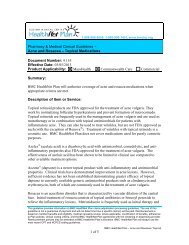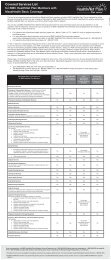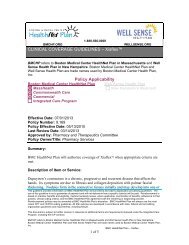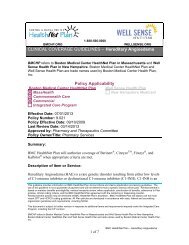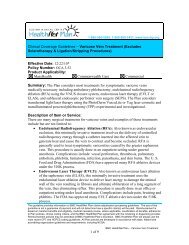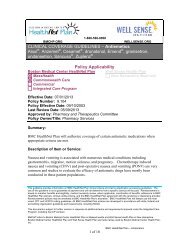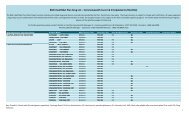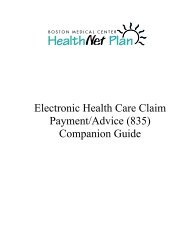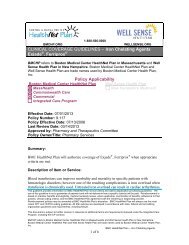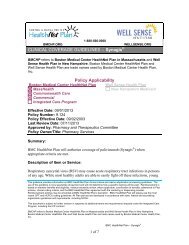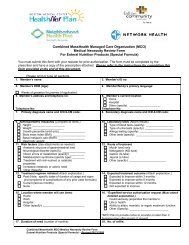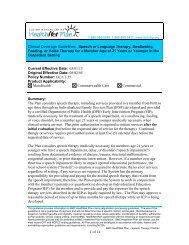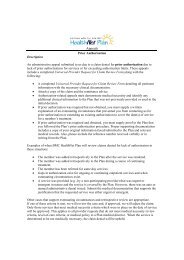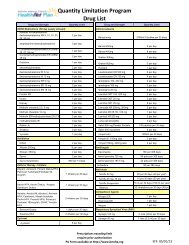IVIG - BMC HealthNet Plan
IVIG - BMC HealthNet Plan
IVIG - BMC HealthNet Plan
You also want an ePaper? Increase the reach of your titles
YUMPU automatically turns print PDFs into web optimized ePapers that Google loves.
used in patients with severe active SLE for whom other interventions have been<br />
unsuccessful or intolerable. 24 Well-controlled trials are needed to determine which<br />
subsets of patients will benefit the most from <strong>IVIG</strong>. <strong>IVIG</strong> is used to treat severe<br />
thrombocytopenia or immune neutropenia. 97 Its role in non-hematologic<br />
manifestations of lupus is less clear. It has been used effectively to treat lupus<br />
nephritis. 97-98 First line therapy for active SLE is corticosteroids and antimalarial<br />
drugs (hydroxychloroquine). Second-line drugs are azathioprine, methotrexate,<br />
cyclophosphamide, or rituximab.<br />
44. Thrombocytopenia refractory to platelet transfusions. Approve for 12 months.<br />
Evidence does not support routine use of <strong>IVIG</strong> but <strong>IVIG</strong> may have a role in patients<br />
with severe thrombocytopenia of documented immune basis for whom other<br />
modalities are unsuccessful or contraindicated. 23<br />
45. Thrombocytopenia, fetal alloimmune. Approve maternal antenatal infusion of <strong>IVIG</strong><br />
for 6 months. 23,30,99 Antenatal therapy with <strong>IVIG</strong> is effective in increasing fetal<br />
platelet counts in neonatal alloimmune thrombocytopenia. 99-100 <strong>IVIG</strong> reduces the risk<br />
of intracranial hemorrhage and increases the fetal platelet count. In newborns with<br />
fetal/neonatal alloimmune thrombocytopenia, first-line therapy is antigen-negative<br />
compatible platelets and <strong>IVIG</strong> is adjunctive. 30<br />
Transplantation. See End stage heart failure, renal disease, lung or liver disease. See<br />
Small bowel transplant.<br />
46. Urticaria, chronic autoimmune. Approve for 6 months of therapy in patients with<br />
chronic autoimmune urticaria who have tried all of the following medications:<br />
A. a first generation antihistamine (e.g., chlorpheniramine, diphenhydramine,<br />
hydroxyzine),<br />
B. a second generation antihistamine (e.g., loratadine, cetirizine (Zyrtec ® ),<br />
fexofenadine, desloratadine (Clarinex ® )),<br />
C. an H2-receptor antagonist (e.g., ranitidine, cimetidine, doxepine),<br />
D. a corticosteroid, and<br />
E. at least one of the following: cyclosporine, montelukast (Singulair ® ).<br />
After initial 6 months approve for another 6 months if patient is improved. Further<br />
authorization after 12 months total is not recommended.<br />
One cycle (5 days) of <strong>IVIG</strong> was beneficial in 9 of 10 patients with chronic<br />
autoimmune urticaria who had poor responses to antihistamines with 3 of the<br />
patients having prolonged remission. 101 In a single center open-label study, 29<br />
patients with autoimmune urticaria received 0.15 mg/kg of <strong>IVIG</strong> every 4 weeks<br />
for a minimum of 6 months and a maximum of 51 months. 102 There was clinical<br />
improvement in 26 patients with reduced urticaria or angioedema and decreased<br />
This guideline provides information on <strong>BMC</strong> <strong>HealthNet</strong> <strong>Plan</strong> claims adjudication processing guidelines. The use of this<br />
guideline is not a guarantee of payment and will not determine how a specific claim(s) will be paid. Reimbursement is<br />
based on member benefits and eligibility, medical necessity review, where applicable, coordination of benefits, adherence<br />
to <strong>Plan</strong> policies, clinical coding criteria, and the <strong>BMC</strong> <strong>HealthNet</strong> <strong>Plan</strong> agreement with the rendering or dispensing provider.<br />
Reimbursement policies may be amended at <strong>BMC</strong> <strong>HealthNet</strong> <strong>Plan</strong>’s discretion. <strong>BMC</strong> <strong>HealthNet</strong> <strong>Plan</strong> will always use the<br />
most recent CPT and HCPCS coding guidelines.<br />
<strong>BMC</strong> <strong>HealthNet</strong> <strong>Plan</strong> – <strong>IVIG</strong><br />
24 of 45



